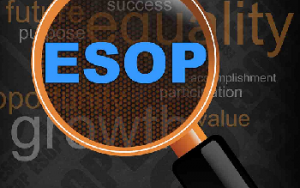In this blog post, Abhay Singh, a student of Amity University, Rajasthan, who is currently pursuing a Diploma in Entrepreneurship Administration and Business Laws from NUJS, Kolkata, writes about the essentials that employees need to know before they strike an ESOP deal with their employers.
Introduction
An Employee Stock Ownership Plan (ESOP) provides employees with the benefit of acquiring stock or ownership in the company. It is a plan being provided by the employer to the employee.
Under this plan, certain stock is being given to the employee at very less or negligible price which remains in the ESOP trust fund until being exercised by the employee at the time of retirement or so on. It helps in the solving the problems related to the incentives as well increasing the value of the shares by involving stockholders.
Involving employees in this plan will provide them knowledge of the shares which motivates the employees to work hard to raise the value of the shares and enhance the company’s value ultimately.
How Employee Stock Ownership Plan (ESOP) works?
It is an employee benefit plan under which employees are given stock as bonus for their work which makes the employees shareholders of the company and makes them well versed with the market price of the shares so that they work hard to increase the value of the company and ultimately increase the market value of the share which will benefit the both the employer and employee.
It makes plan participants focus on company value and market share appreciation of the company. They work hard for the price appreciation of the company so that there must be an increase in the value of the company ultimately benefitting shareholders.
Rights under Employee Stock Ownership Plan (ESOP):
-
Summary Plan Description
Employers of the company must provide the details of Employee Stock Ownership Plan (ESOP) to the employees. Details such as rules relating to entering into the ESOP and when the employees will get the benefit of the plans, how they can file complaint when the plan is not properly operating or is not functioning properly. The employees must get the documents within 90 days of becoming a participant and Summary Plan Description (SPD) must be made after all the necessary material amendments have been made. The employee must be given the clear information about the Summary Plan Description (SPD). The employer must also provide the handbook related to the plan.
-
Summary Annual Report
Companies must provide a report within seven months of the end of every fiscal year. Every participant of the Employee Stock Ownership Plan (ESOP) must have the right to go through the annual report by the company. These reports provide the information regarding the work activity and assets of the company.
-
Individual benefit statement
Every employee must get the individual benefit statement which provides the information regarding the fair market value of the shares and their assets, if any, under the ESOP. It must be provided every year to the employee. The employee has the right to challenge the accuracy of the report. They must be informed as to how they will make use of such benefit and tax consequences of each benefit with regards to Employee Stock Ownership Plan (ESOP).
-
Access to plan documents
Every employee has the right to access to the documents, such as individual benefit statement providing information regarding the individual fair market value of the shares and their assets, if any, under the ESOP. The annual summary report is another document being provided to the employee for the inspection and summary plan description which provides details regarding the information of the plan.
-
Employee voting and other voting disclosure material
All ESOP employees have some voting right attached to the ESOP plan. ESOP must have the right to direct trustee on the voting of allotted shares i.e. sale of company’s stock. In public companies, the voting rights of the employee are as same as other shareholders, given the equal status in the public limited company. Whenever voting is required, the employee must be given clear information regarding the issue so that proper voting is done employee for the benefit of the company without being partial.
-
Information which is necessary not required to provide by the company
There are some documents and reports which are not necessarily required to be given to the employee such as financial statements, official salaries and share ownership structure and other information. However, they need to provide some final disclosure.
-
Filing claims
If the claims regarding the Employee Stock Ownership Plan (ESOP) are not being provided to the employee, they must be given notice in the writing which must provide the clear information regarding why the claim is being been rejected or the reason behind the delay. The law sets forth the procedure on obtaining the claim and specific timeline and procedure for the same. In case the employees are not satisfied, they can file a civil action in this regard.
-
Legal action
Employees can file legal action with regards to claims not being settled. For claims arising out of improper valuation of the assets under the ESOP, not providing the fair market value of the stocks, misuse of assets, broken promises such delay in the distribution of the claim. ESOP fiduciary, ESOP sponsors, ESOP administrators can be sued for errors in the administration. The employee is entitled to receive compensation, fees and penalties on behalf of the delay of the payment of ESOP.
 Serato DJ Crack 2025Serato DJ PRO Crack
Serato DJ Crack 2025Serato DJ PRO Crack













 Allow notifications
Allow notifications


